
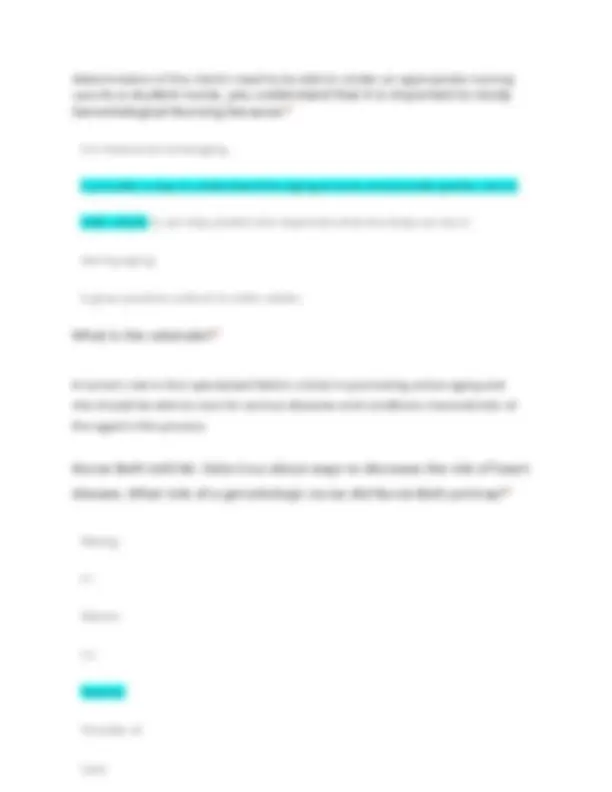
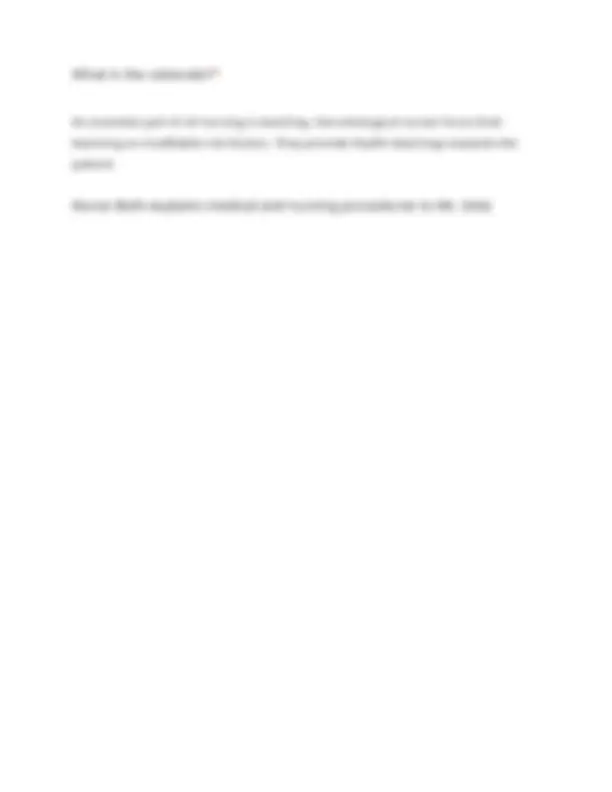

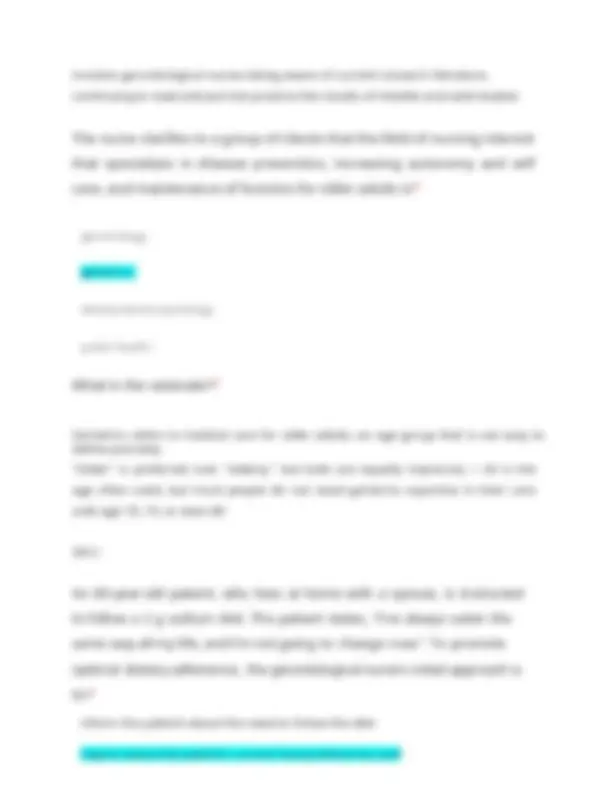
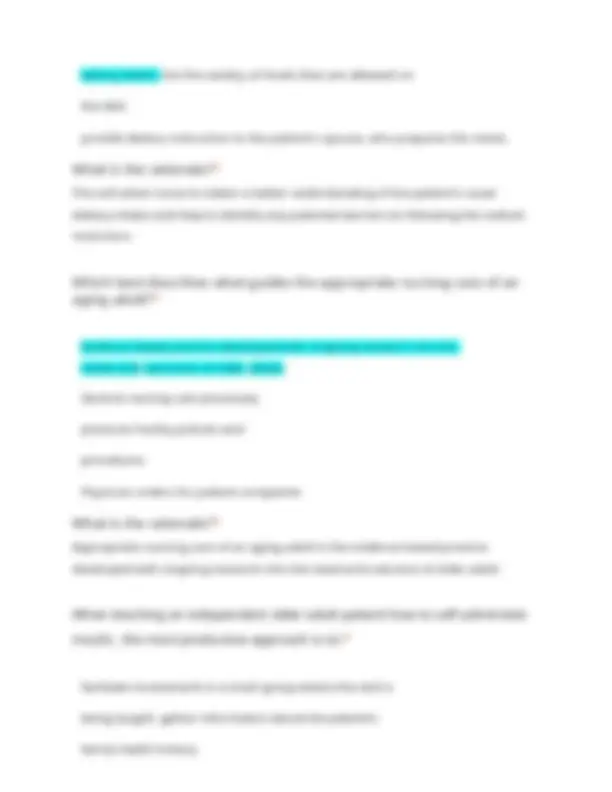

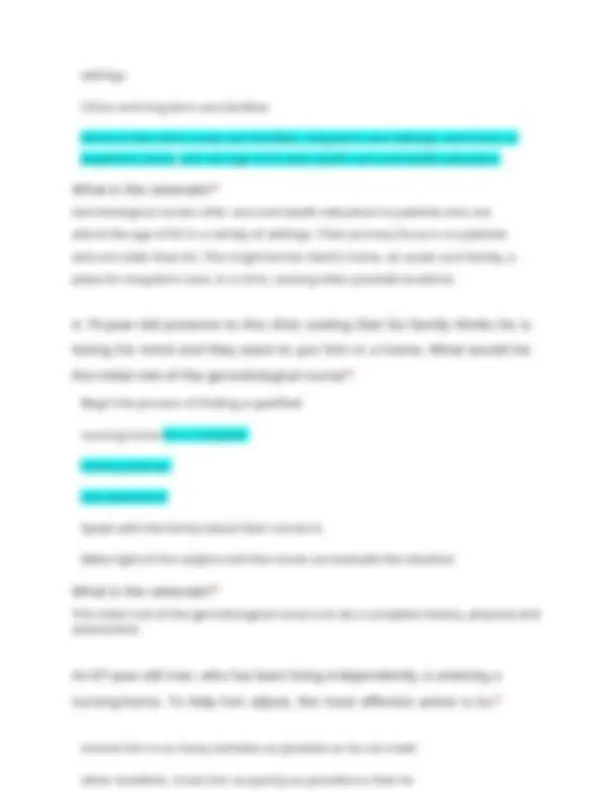
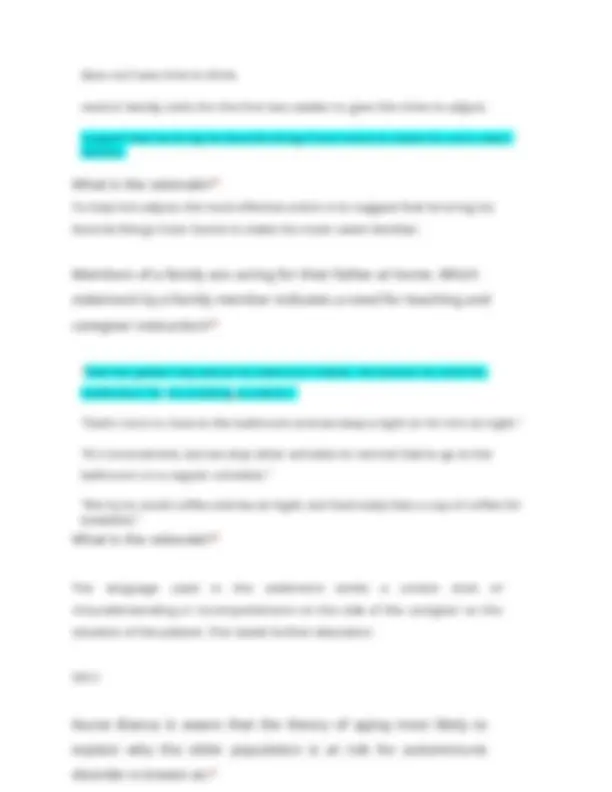

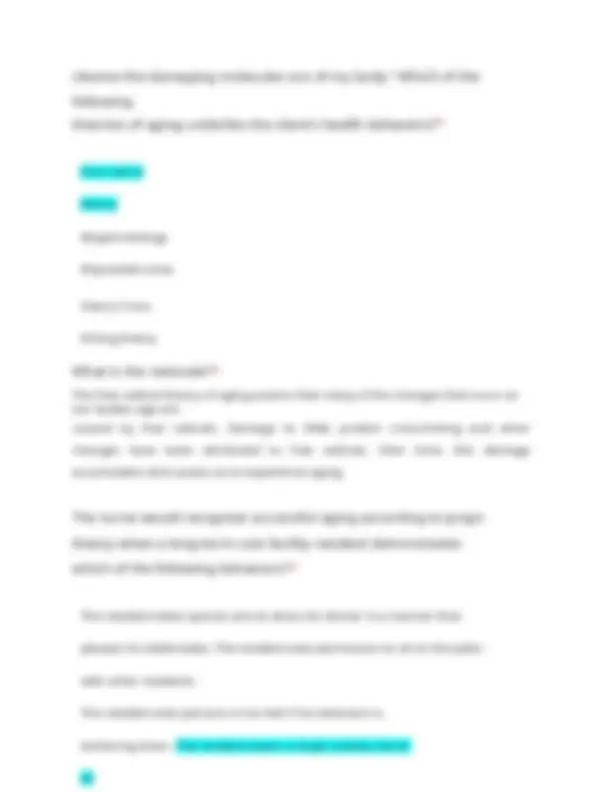

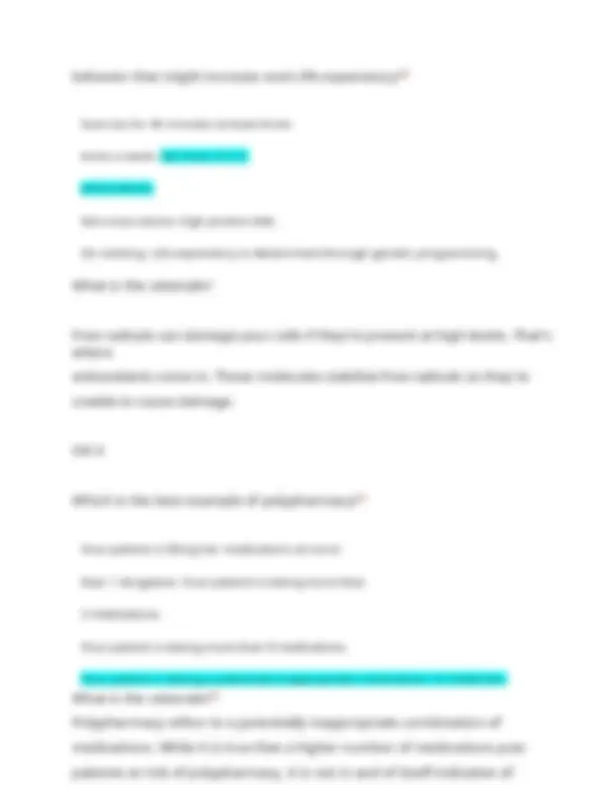


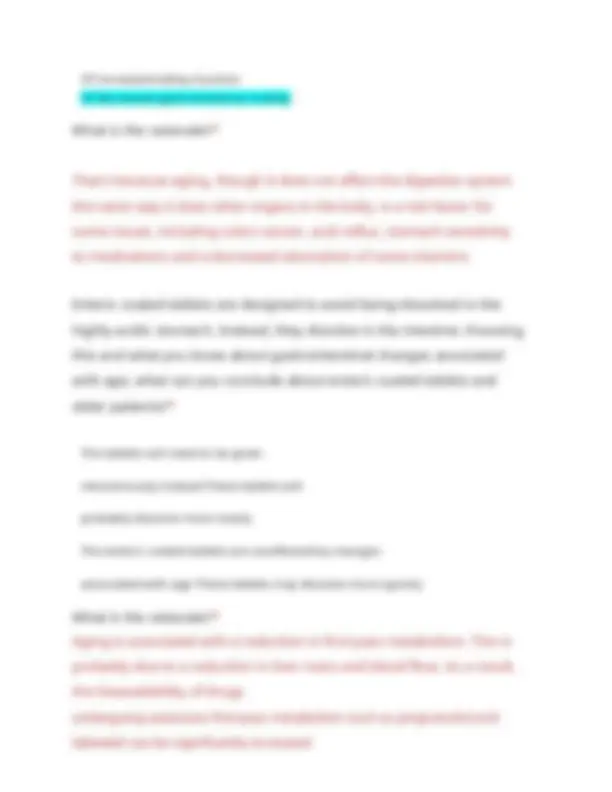
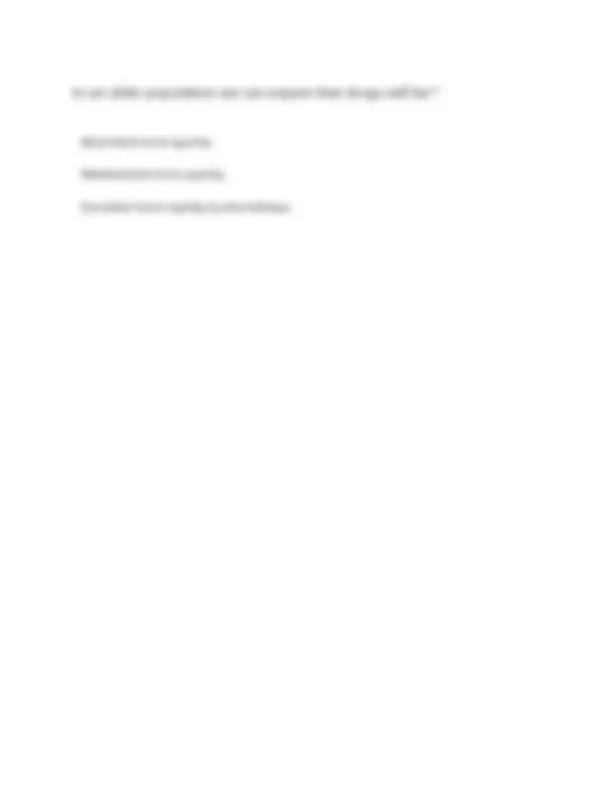
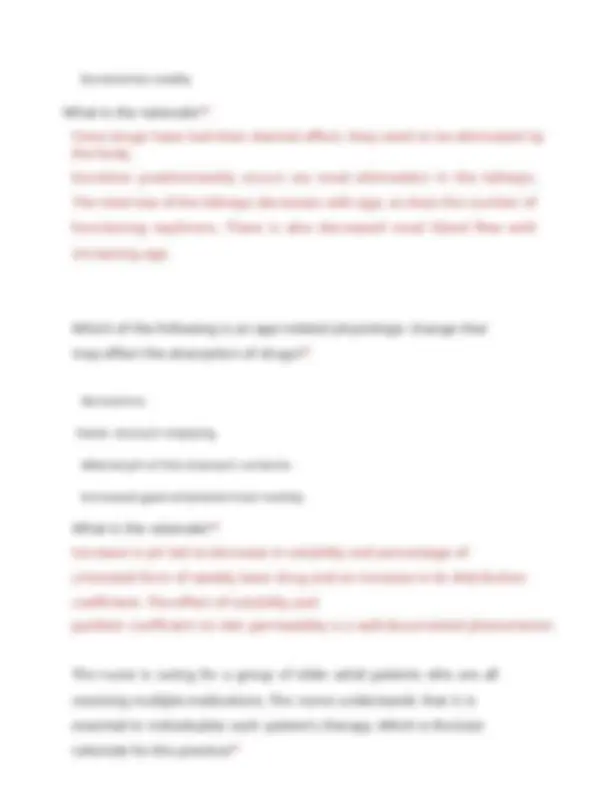

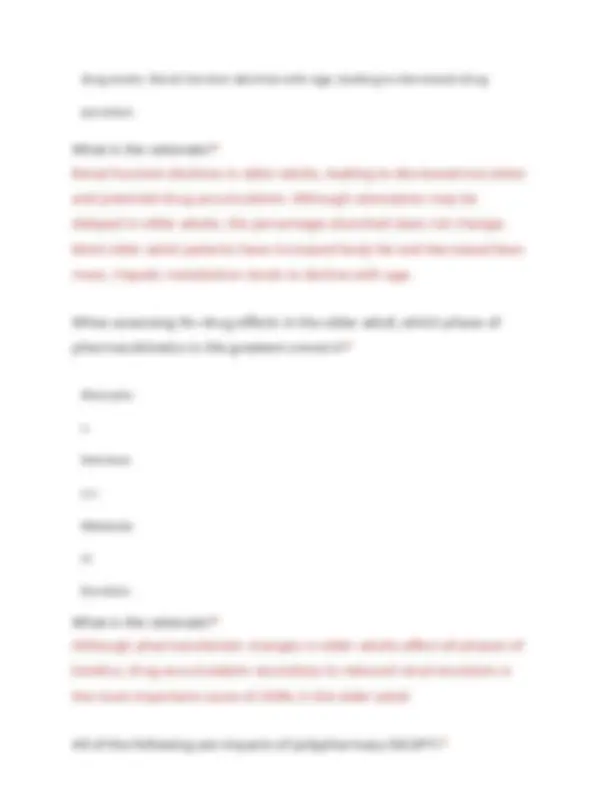
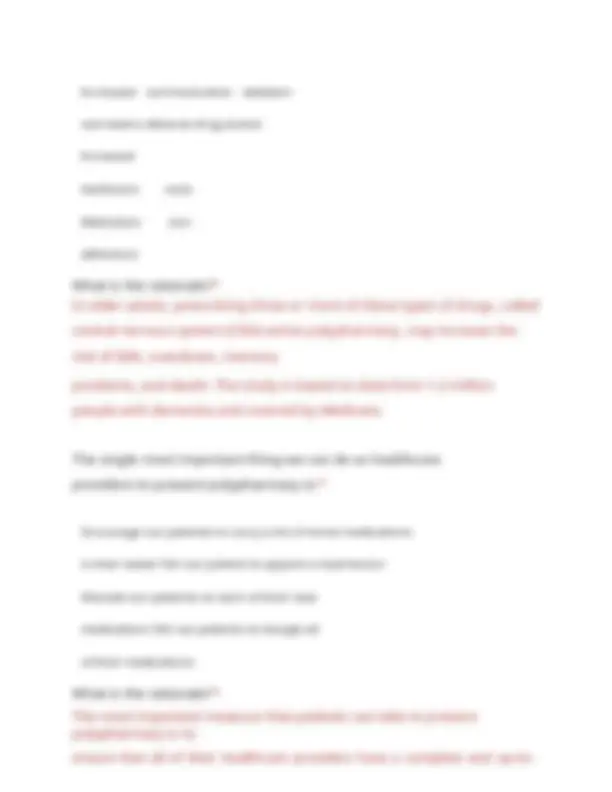
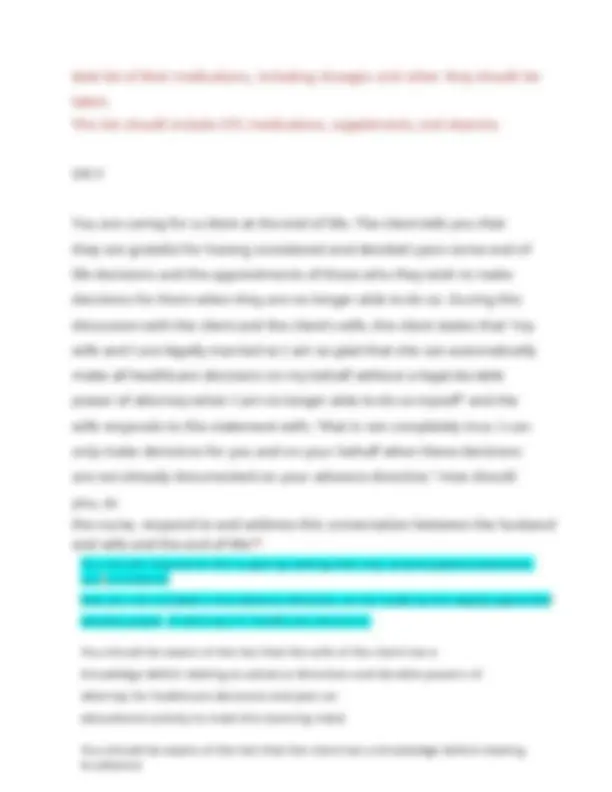
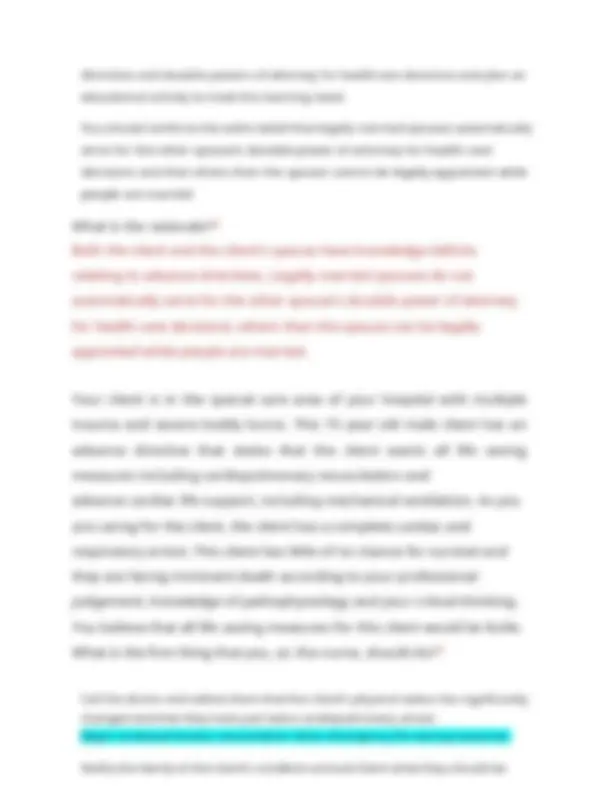
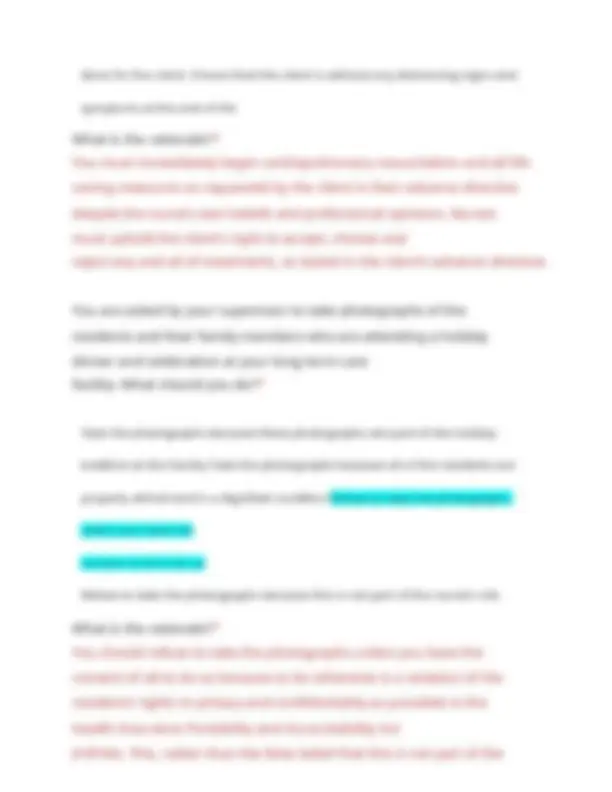

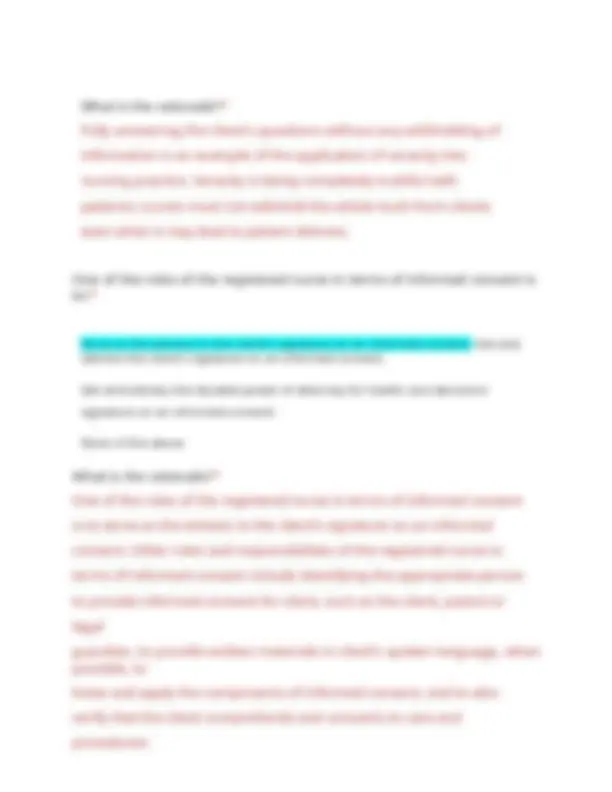

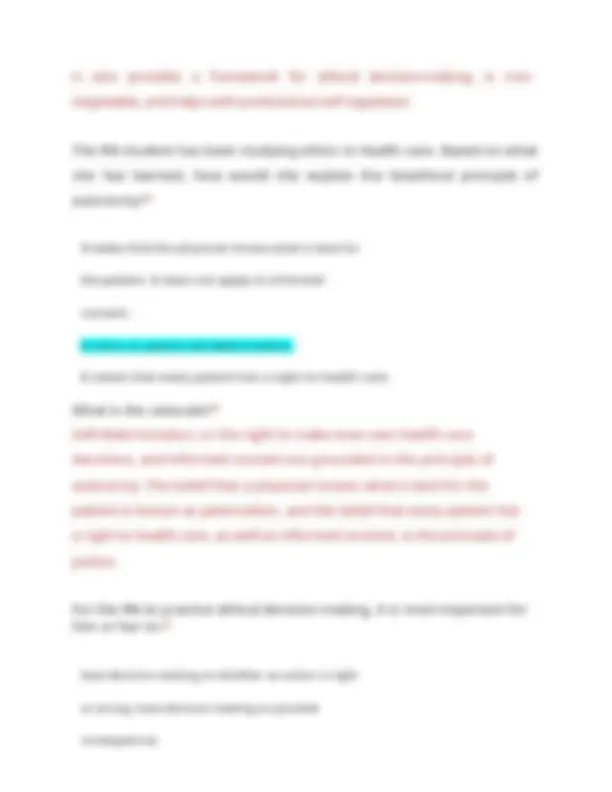

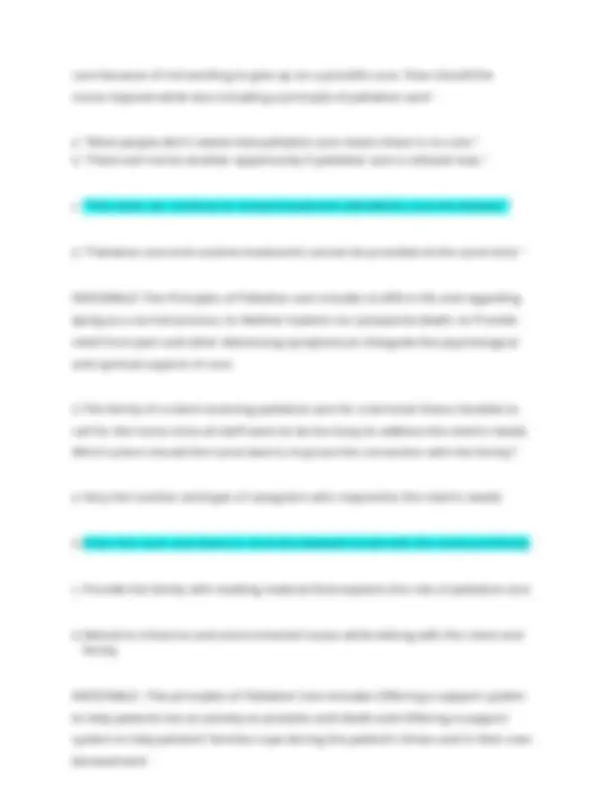

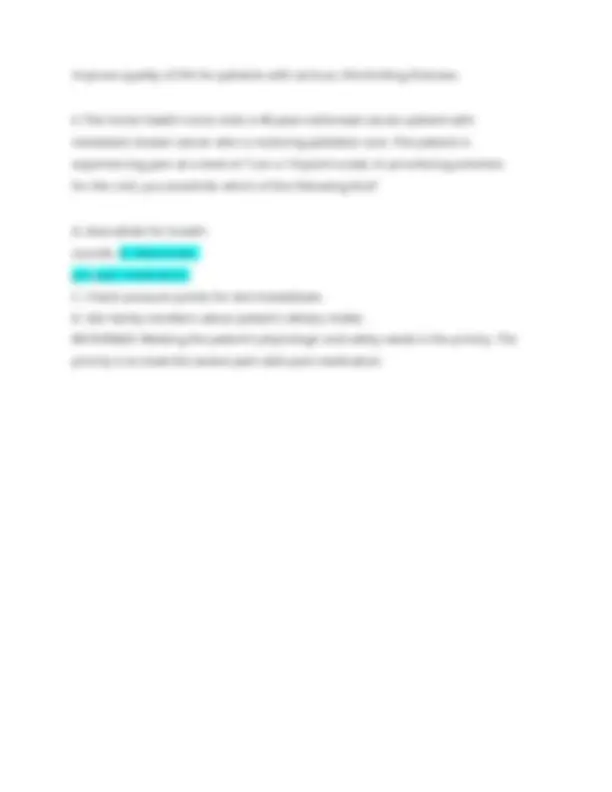
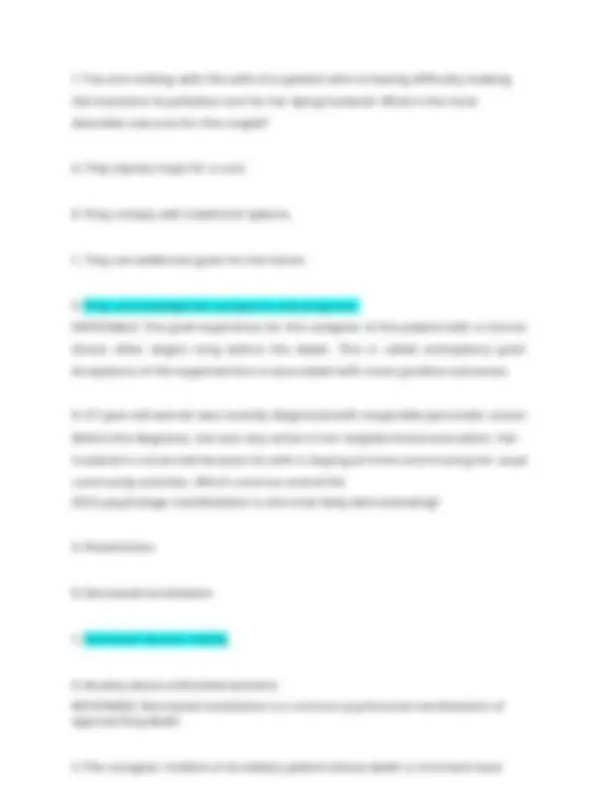

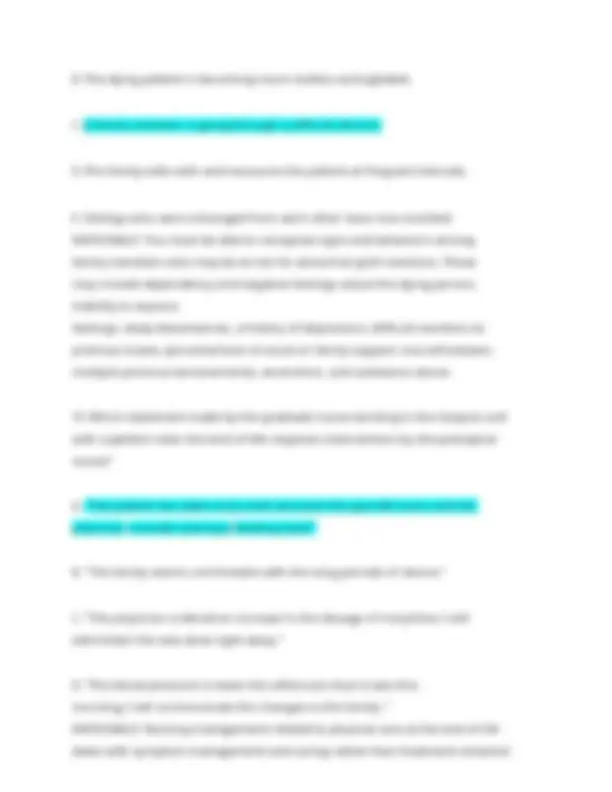



Study with the several resources on Docsity

Earn points by helping other students or get them with a premium plan


Prepare for your exams
Study with the several resources on Docsity

Earn points to download
Earn points by helping other students or get them with a premium plan
Community
Ask the community for help and clear up your study doubts
Discover the best universities in your country according to Docsity users
Free resources
Download our free guides on studying techniques, anxiety management strategies, and thesis advice from Docsity tutors
2025 Sas-Care For Adults Exam Quiz And Correct Answers Graded A+
Typology: Exams
1 / 43

This page cannot be seen from the preview
Don't miss anything!




































Staying away from older adults Education about older adults Travelling to older communities Watching the portrayals of older adults in movies and on TV
Geriatric nurses are educated to understand and treat the often complex physical and mental health needs of older people. They try to help their patients protect their health and cope with changes in their mental and physical abilities, so older people can stay independent and active as long as possible.
Determine client’s need Provide direct nursing care Help client recognize and cope with stressful
psychological situation Works in combined effort with all those involved in patient’s care
Therefore, the best description of a care provider is the accurate and prompt
An essential part of all nursing is teaching. Gerontological nurses focus their teaching on modifiable risk factors. They provide Health teachings towards the patient.
Manag e r Advocat e Teache r Provider of Care
Advocacy may take many forms, including active involvement at the political level or helping to explain medical or nursing procedures to family members on a unit level
Research Consumer Advocate Teacher
“The doctor has asked that you sign this consent form.” “Do you have any questions about the procedure?” “What were you told about the procedure you are going to have?” “Remember that you can change your mind and cancel the procedure.”
This is the best answer because the nurse is assessing the client's level of knowledge as a result of the discussion with the primary care provider.
Collaborator Primary Investigator Producer Consumer
A nurse who reads research articles and incorporates research findings into nursing practice would demonstrate a research roles as a consumer. This
involves gerontological nurses being aware of current research literature, continuing to read and put into practice the results of reliable and valid studies
gerontology. geriatrics. developmental psychology. public health.
Geriatrics refers to medical care for older adults, an age group that is not easy to define precisely. "Older" is preferred over "elderly," but both are equally imprecise; > 65 is the age often used, but most people do not need geriatrics expertise in their care until age 70, 75, or even 80 SAS 2
inform the patient about the need to follow the diet. inquire about the patient's current food preferences and
provide frequent, competitive skills testing to enhance learning. use repeated return demonstrations to promote the patient's retention of the involved tasks.
The repeated return demonstration approach is an approach to teaching that involves demonstrating a skill or concept multiple times to a learner. This approach is often used when teaching complex tasks or skills that require a high level of coordination. This approach allows the learner to see the skill or concept being demonstrated multiple times, which can help them to better understand and learn the task or skill.
ask the family member to answer the questions. ask the same questions in a louder and lower voice. determine if the patient knows the name of the current president. rephrase the questions slightly, and slowly repeat them in a lower voice.
It is possible that the patient does not understand the language or words the nurse used. Older patients have difficulty hearing high-pitched sounds, so a lower voice must be used in talking to them.
that abnormal responses to the aging process determine the appropriate nursing diagnoses. that the health status data of older adult patients be documented in
settings Clinics and long-term care facilities Home of the client, acute care facilities, long-term care settings, and clinics or anywhere clients over the age of 65 seek health care and health education
Gerontological nurses offer care and health education to patients who are above the age of 65 in a variety of settings. Their primary focus is on patients who are older than 65. This might be the client's home, an acute care facility, a place for long-term care, or a clinic, among other possible locations.
Begin the process of finding a qualified nursing home Do a complete history,physical, and assessment Speak with the family about their concerns Make light of the subject until the nurse can evaluate the situation
The initial role of the gerontological nurse is to do a complete history, physical and assessment.
involve him in as many activities as possible so he can meet other residents. move him as quickly as possible so that he
does not have time to think. restrict family visits for the first two weeks to give him time to adjust. suggest that he bring his favorite things from home to make his room seem familiar.
To help him adjust, the most effective action is to suggest that he bring his favorite things from home to make his room seem familiar.
"Dad has gotten lazy about his bathroom habits. He blames his arthritis medication for his toileting accidents." "Dad's room is close to the bathroom and we keep a light on for him at night." "It's inconvenient, but we stop other activities to remind Dad to go to the bathroom on a regular schedule." "We try to avoid coffee and tea at night, but Dad really likes a cup of coffee for breakfast."
The language used in the statement sends a certain level of misunderstanding or incomprehension on the side of the caregiver on the situation of the patient. This needs further education. SAS 3
being studied. For a very long time, it was believed that taking more antioxidants, such vitamin C, may slow down or even reverse the consequences of ageing. However, it is now understood that consuming additional antioxidants might be harmful to one's health.
continue her daily walking routine. curtail further increases in physical activity. document preferred end- of-life interventions. avoid exposing herself to crowds.
You can prevent bone loss with regular exercise, such as walking. If you have osteoporosis or fragile bones, regular brisk walking can help to keep your bones strong and reduce the risk of a fracture in the future.
Jung Erikson Newman Havighurst
Carl Jung's theory of development proposes that an individual progresses through life searching and setting goals for him or herself in an ongoing search for one's "true self." The "mid-life crisis" is the time in which the individual reevaluates his or her life and progresses toward his or her true self. The theories of Erikson, Newman, and Havighurst do not include a mid-life crisis
Gene theory Programmed theory Rate of living theory Somatic mutation theory
ticking that determines the number of cell divisions that occur before death. The rate of living theory postulates each person has a finite number of heart beats. The gene theory discusses aging from the perspective of one or more harmful genes that are activated over time and bring about age-related changes. The somatic mutation proposes that aging is caused by environmental damage to DNA
times because he likes it.
Jung describes a successful adjustment to aging as being accepting and valuing of self regardless of the view of others.
Trust vs mistrust Integrity vs Despair Industry vs Inferiority Generativity vs stagnation
Ego integrity versus despair is the eighth and final stage of Erik Erikson's stage theory of psychosocial development. This stage begins at approximately age 65 and ends at death. It is during this time that we contemplate our accomplishments and can develop integrity if we see ourselves as leading a successful life.
Activity Age stratification Disengageme n t Exchange
Exercise for 45 minutes at least three times a week. Eat food rich in antioxidants. Eat a low-calorie, high protein diet. Do nothing. Life expectancy is determined through genetic programming.
Your patient is filling her medications at more than 1 drugstore. Your patient is taking more than 2 medications. Your patient is taking more than 9 medications. Your patient is taking a potentially inappropriate combination of medicines.